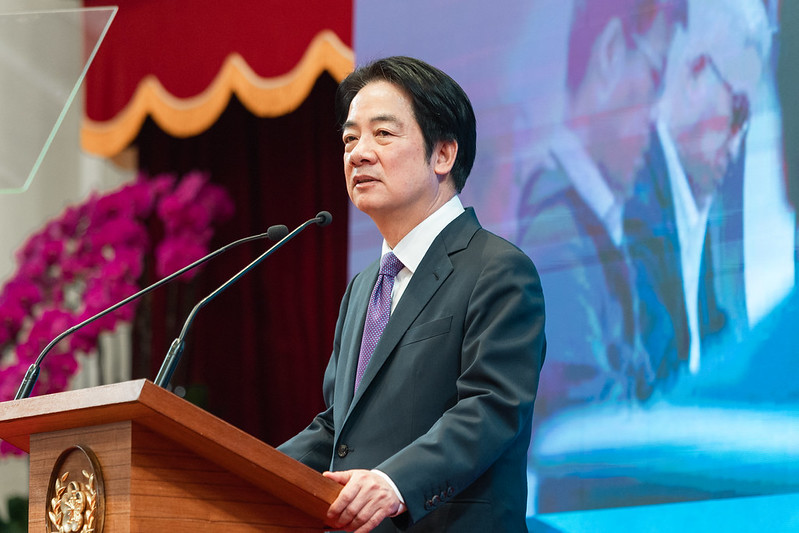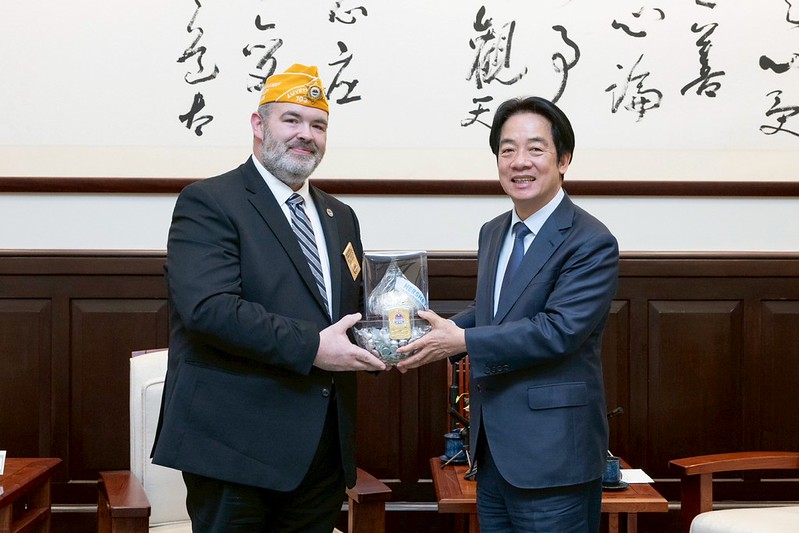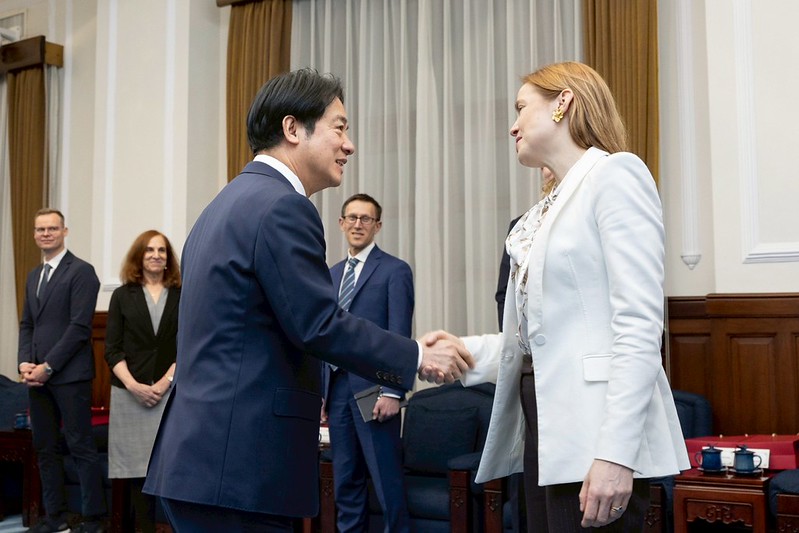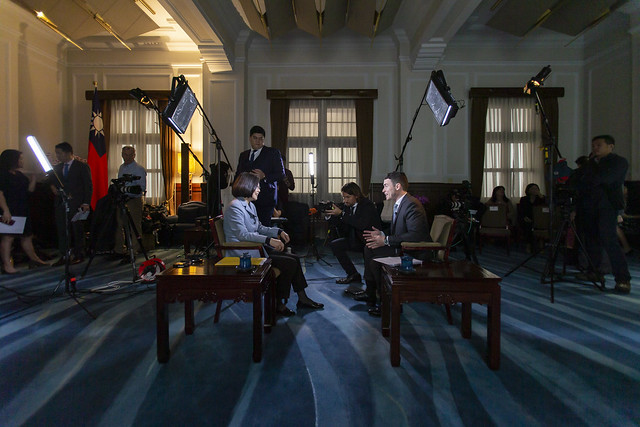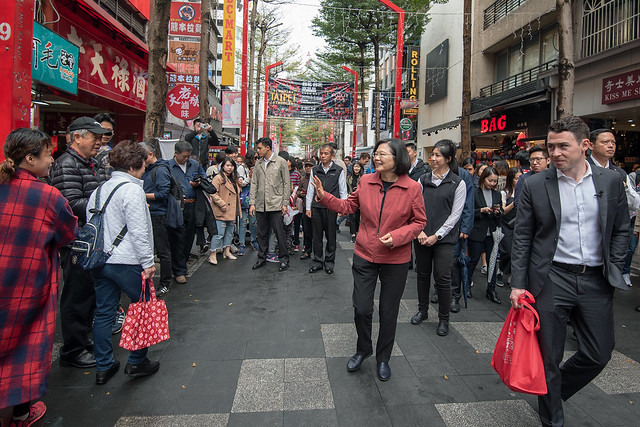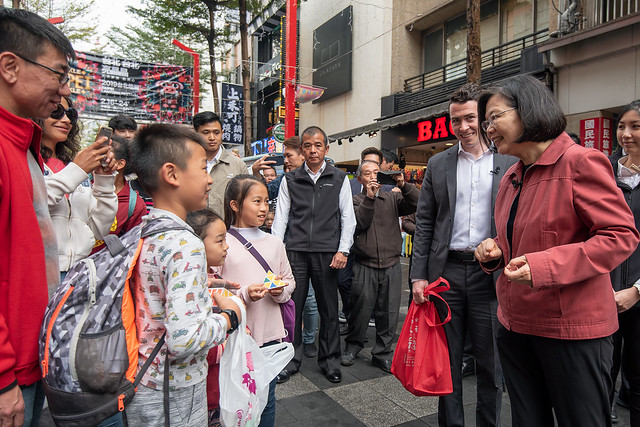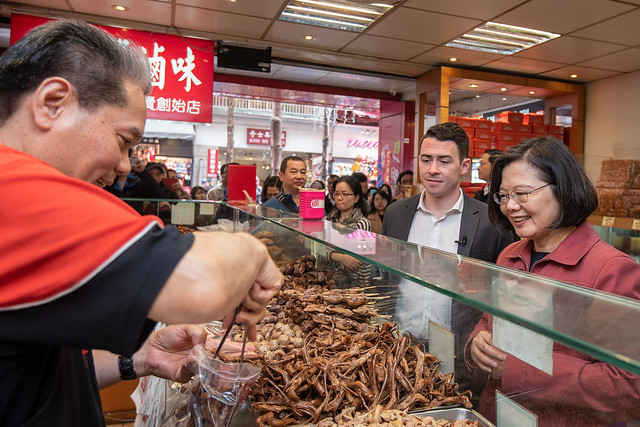News & activities
 News releases
News releases
In a recent interview with CNN, President Tsai Ing-wen responded to questions regarding developments in the international sphere, Taiwan-US relations, and cross-strait relations.
The text of the interview follows:
Q: I wanted to begin with your new year's address. Earlier this year you gave an address, and you specifically said that China must respect that Taiwan will never give up its sovereignty. Explain that a little bit, and do you ever foresee, under any circumstance, Taiwan reunifying with the Mainland?
A: We need to look at the current overall international situation and Taiwan's own situation. We are facing a China that is growing stronger and stronger, and its ambitions are also getting stronger and stronger. In fact, it seeks to become a world hegemony. If we look back, Taiwan has been a successful example with respect to the development of its economy, democratic system, and core values, such as human rights and freedom. Taiwan has done well in such areas. We, the people of Taiwan, are very proud of the progress made over these past postwar decades.
However, unlike before, the China that we are facing has become stronger by the day, as has its ambition. The threat from China is also growing. Under such circumstances, our greatest challenge is whether we can continue to maintain our independent existence and security, our prosperity from economic development, and our democracy. To Taiwan, this is the most important question at hand.
Chairman Xi Jinping's New Year's address alerted Taiwan to the fact that its independent existence could be changed, because Xi has started to talk about unification and the "one country, two systems" concept. This is a grave warning to the people of Taiwan. We had to immediately and clearly reiterate that the people of Taiwan cannot accept "one country, two systems."
We realize that we cannot convey a vague message out of courtesy or diplomatic considerations. We must clearly tell China's leaders that Taiwan will not accept "one country, two systems."
Here I would like to especially say that China's ambitions and intentions do not just involve Taiwan. It seeks opportunities to control or influence all countries in the region, and even beyond. China's pressure on Taiwan is an issue not only for Taiwan, but for all regional countries and beyond. It is a problem that all of us must face together.
Q: Going back a little bit to what you first talked with Xi Jinping. We've heard President Xi's rhetoric about "never losing an inch of our motherland." We've seen his practice of increasing military drills around Taiwan and the Taiwan Strait. How have such threats affected your policy, your policy making here in Taiwan and have they forced you, has his rhetoric forced you, or China's policies forced you, to become more hardline yourself?
A: Indeed China has steadily stepped up its military threat against Taiwan. In fact, its military threat is not limited to Taiwan. It extends to the entire region. China has certainly increased its military preparedness and capability rapidly over the past few decades. This has awoken us to the fact that we must continue to enhance our own defense capability. We must reevaluate our strategies, especially in drawing up an asymmetrical warfare approach.
We also hope that if we are threated militarily by China, many neighboring countries and like-minded nations will come together in support of Taiwan. We hope they will safeguard Taiwan, this very important place in terms of security, industry, and free and democratic development.
Q: Given that threat, given what we're seeing in Chinese state media, certain pundits in Chinese state media have been fueling speculation over an invasion sooner rather than later. How concerned are you about that scenario? Do you think that state media in China is bluffing, or do you see Taiwan facing an unprecedented existential crisis?
A: I don't think that any president or leader would rule out the possibility of military conflict. That's why we have to ensure that our military preparedness is at its best at all times. However, military action must come from a formal political decision. Therefore, in our many political deliberations and counterstrategies, we must take into account how to increase the political cost that China would incur if it were to use force against Taiwan. If the political cost is high enough, I don't believe that the Chinese leader would rashly resort to military action.
Q: Clearly Beijing is trying to extract both political and also economic costs on you and Taiwan as a whole. Airlines, automakers, clothing lines--even the bakery, I believe, that you visited in California have been pressured by Beijing. Do you find it frustrating, depressing as the leader of Taiwan that you consistently see those kind of actions from Beijing, and what do you think you can do to change that?
A: I think that perhaps China believes that by doing this, it would make the Taiwanese people feel even more frustrated, that it would lower our morale. In reality, if we observe the Taiwanese people, every time such an incident occurs, we all become very angry. We feel less and less amicable toward China. What I want to say is that such actions by China actually have the opposite effect on Taiwan. They do not, as China imagines, force the Taiwanese people to concede. They do not produce the intended result.
Q: We saw the KMT make significant gains in recent local elections. What do you take away from that, and is that not a clear signal from the public that they are dissatisfied with the current direction of the country or of Taiwan? And what is the message that the people send to you and your administration?
A: The recent local elections were simply that, local. The main focus was issues of domestic policy. Since I took office in May 2016, we have made some bold moves regarding reform, including pension reform. People affected by these moves were displeased, and their disaffection accumulated and spread. At the same time, Taiwan's society has seen differing opinions on divisive issues, for example same-sex marriage. During the elections, there was a clash of opinions.
Also, certain domestic policy measures did not address the needs of the vulnerable. As a result of such issues, the people decided to send a warning to the governing party during these local elections. But as these were local elections, cross-strait relations were not a key issue. So the results cannot be interpreted to mean a change in attitude toward China.
Q: Speaking of elections, we have seen disinformation campaigns run by autocratic governments across the world. Your government has said that it too is worried about disinformation campaigns. What did you see in terms of a specific disinformation campaign during the last set of elections and are you worried about another disinformation campaign during the upcoming elections in 2020?
A: Disinformation was indeed an important issue in this past election. In addition to disinformation, attacks by external cyber forces also had a major impact. Some disinformation was from within Taiwan, but a great deal was manufactured elsewhere. Accounts in many nations were used to send disinformation to Taiwan. Disinformation definitely had an impact on voters' judgment in this election, that is true. After the election we began to discuss how to address disinformation because it had already harmed our democracy.
In a democracy, people vote to express their opinion. But voters must be acting on accurate information. If their information is false, the ballot they cast will show a bias. Under such conditions, democracy is harmed.
Regardless of political party, we all have a common interest. Taiwan's democracy must be a well-functioning democracy. We must have a solution to deal with disinformation and cyberattacks from certain sources. So on the one hand, we are strengthening our legal framework to manage these issues. On the other, we are improving the government's ability to make clarifications. Most importantly, disinformation is largely coming in from outside Taiwan using foreign accounts. This means Taiwan is not the only one who suffers. Transnational cooperation is required. We have started to discuss such cooperation to fight disinformation with other countries.
Q: So I'd like to move to your relationship with the United States, and starting with then President-elect Donald Trump. He accepted, in an unprecedented move, a congratulatory call from you shortly after the election in 2016 before he took office. What did that signify to you?
A: I was grateful to have this opportunity to speak directly with the President of the United States. This happened just after President Trump won the election. Through the phone call, we hoped to congratulate him. We also briefly exchanged ideas on bilateral ties. This was the first phone call involving the presidents of our respective nations since we broke diplomatic ties with the United States nearly four decades ago. But there was something more important than the content or fact of the phone call. The call was meaningful because it bolstered communication between the US and Taiwan. This means more effective communication at a higher level. With this, bilateral ties can advance, or the likelihood of progress grows. So I was grateful to have this opportunity, as it meant we are communicating at a higher level, even if it isn't always at the presidential level.
Q: And yet we do know that Donald Trump is an unconventional US president. Given how we have seen him buck other international norms throughout his presidency, and given the United States' current priority in making deals with the Mainland, how would you address those concerns?
A: We understand that any President, when making decisions, has to consider many factors, especially the interests of his or her own country. In this vein, President Trump has consistently stressed America First.
As for how we manage relations with the US or other countries, looking at our current situation, and with the pressure from China, the level of uncertainty is indeed relatively high in many regards. We are very accustomed to dealing with such uncertainty and making sure that it does not fundamentally affect our decision-making model.
Q: A group of Senators in the US recently asked Speaker of the House Nancy Pelosi to formally extend an invitation to you to address a joint session of Congress. Should that invitation ever be formally extended to you by the Speaker of the House, would you accept it?
A: This is not a simple question of extending and accepting an invitation. Before issuing such an invitation, the US would certainly take into account its own interests and assess the overall political situation. From our perspective, would we accept such an invitation if it were extended? We would have to look at it from several angles. Would delivering an address in Washington, DC, be in the interests of Taiwan, benefit Taiwan-US relations, and serve peace and stability in the region? It would require comprehensive consideration. If such an invitation were in fact to be extended—which at the moment is still very much hypothetical—we would deal with it very carefully. Let me reiterate that we would take into account Taiwan's own interests, regional stability, as well as Taiwan-US relations. We would seek to do a very thorough evaluation.
Q: I wanted to ask you about the US launching a campaign against certain Chinese tech firms, most notably Huawei, basically accusing companies like Huawei of acting in concert with Beijing, acting as an arm of the surveillance state. The US has encouraged other countries not to use Huawei products. In your experience, are those concerns justified based on what you've seen here in Taiwan in similar circumstances and what would your advice be to the US and another countries facing this situation?
A: In terms of managing the Huawei situation, we've taken an extremely cautious attitude, too. Our government has a special task force to deal with this. In terms of restrictions, we've limited the use of Huawei products at government agencies or organizations that have access to more sensitive information.
Q: So with the Taiwan Travel Act, with the US approval to sell certain submarine technology to Taiwan, we have seen signs that the US military and government is strengthening its ties with Taiwan. That said, what we also hear is President Xi routinely using the kind of rhetoric saying that he will never renounce the use of force. So forgive the blunt question but: "If China invaded tomorrow, would you count on the US military to be there?"
A: Our defenses are well prepared for an attack at any time—for any situation where we would need to fend China off for 24 hours. So looking at Taiwan's defense capabilities for this kind of situation, we are capable of holding off any first wave of attacks. So I think that for China itself, after its first wave of attacks, it would have to respond to international pressure, and the shock to its own economy. So we would hope that after withstanding any first wave of attacks ourselves, other countries throughout the world would stand up in unison and put strong pressure upon China in response.
Q: And you are confident that they would do so led by the United States?
A: It's rather like I already mentioned. If it's Taiwan today, then everyone is sure to ask, "Which country will it be tomorrow?" There are countries in the region who might wonder whether they will be facing the same military threats if they fail to toe China's line. So I don't think any attack is something that Taiwan would have to put up with purely on its own. It would reveal China's intent, showing that China will not hesitate to use military power in seeking to promote its expansionist ambitions.
So under such circumstances, not only Taiwan's interests would be impacted. The overall interests impacted, and the potential damage, would be regional, or even global.
Q: And here you are, sitting here as the President of Taiwan, but more than that, you are also one of the only female political leaders in the world. What does that mean to you?
A: Being the female President of Taiwan is very meaningful. Taiwan is the first democracy in the long history of the ethnic Chinese world, and this democracy produced a female leader. In other words, women should not be restricted. There is no limit to what women can achieve. Looking at it from another perspective, Taiwan's democracy is a truly commendable achievement. It is indeed very meaningful for the development of democracy in general that such an excellent democracy could appear in the ethnic Chinese world and that it could produce a female President.
Q: And yet what we see are certain Chinese officials, certain state media, they attack you constantly, not just your policies but personally. They used quotes saying that you're emotional, and extreme as a leader. And it's directly tied to you being a woman oftentimes. How do you not take that personally? How do you deal with those kinds of verbal assaults?
A: Such assaults happen every day. They come not just from China but also from within Taiwan. Leaders, whether male or female, have to face a wide array of attacks. Many of these attacks are based on conjecture, or created on purpose. They often stem from false information or distortions of facts. The most important thing is that a leader's judgment is not affected by these deliberate attacks. Perhaps the goal of people initiating these attacks is to impact the determination or judgment of leaders. Our most important task is to understand why people make these attacks and make sure we are not affected by them.
Q: Is there a part of you that hates having to answer questions about being a female politician? But is there not a part of you that wishes that female leaders were normalized enough that in every single profile interview you do, you would not have to answer these kinds of questions?
A: Until female leaders are a normal and common sight, every female leader, including myself, has an obligation to answer related questions.
Regardless of whether I like these questions, I believe I have an obligation to answer them on behalf of women.
Q: I wanted to ask you about your dogs and cats, who have kind of become famous in their own right, throughout the campaign, social media. How much is being an animal lover, how much is having a full house of animals, three dogs two cats, how much is that a part of who you are?
A: Of course, I greatly cherish these animals, and I enjoy interacting with them, I hope that they can have a happier life. But I also want to convey a message to the public with my cats and dogs. My cats are rescued strays, and my dogs are retired guide dogs. Many in our society choose not to care for such animals. But I want to show that retired dogs can be just as cute and loveable. Rescued cats are just as capable of interacting with you emotionally, and are often more intelligent. They very much deserve to be properly appreciated. By doing this as President, I hope that others can follow my lead and cherish these stray animals and these retired and older dogs, and make a greater effort to care for them.
Q: And finally, Madam President, I wondered if I might get you tell us something about yourself that maybe the public doesn't know. Did you ever skip a class in high school? What's your favorite karaoke song? Tell me something that maybe the public doesn't know about you, and maybe they'd be surprised by.
A: After so many elections, there's not much left the public doesn't know. But in answer to your question, yes, there were times I really didn't want to go to class, so I skipped it.
As to karaoke, no one has ever asked me this before, I can answer that. Yes, I've been to karaoke, but I never sang. Usually when I went with friends, I would bring a book and listen to them singing.
Q: I just wanted to ask you, I guess while we're on the plane about the rigors of the job. Is being president something, that, obviously we know it's a 24/7 kind of job. Does the relentlessness of the work ever get to you, you know, in terms of having to constantly be on call and doing things every day?
A: Well, once you get used to it, it's the life of every politician I guess. Especially elected politicians. You have to prepare to meet with different people at different times and perhaps the first ten minutes you meet with a group, and another ten minutes with another group. So, you have to change your mind, and get yourself prepared for another group in five or ten minutes.
Q: Yeah, you're wearing different hats. Yeah, yeah. Is there anything you look back on in your first couple years in office and say, "That's a regret" or "That's a disappointment," something you could've or should have done differently?
A: Well, that is a tough question. I think for the first and the first half of the second year, I spent too much time managing government affairs, and I also spent a lot of time making foreign visits to our diplomatic allies. So I sort of, many people thought that I was a bit detached from them, because when I was an opposition leader, when I was a presidential candidate, they saw me all the time, talking to them directly. When I became the president, I seemed to be somewhat rather isolated and they feel that there was a distance of some sort between me and them. So if I regret anything, I would say, yes for the first one-and-a-half years, perhaps I should spend more time to go out and to meet with people and talk to them. So that they can get a sense that this is a politician that we are familiar with.
Q: Any thoughts on 2020 yet? Whether you're going to seek reelection, or any thoughts on your future?
A: Well, it's natural that any sitting president wants to do more the country, wants to finish things on his or her agenda, and it's quite natural for a president seeking another four years to complete his or her agenda.

